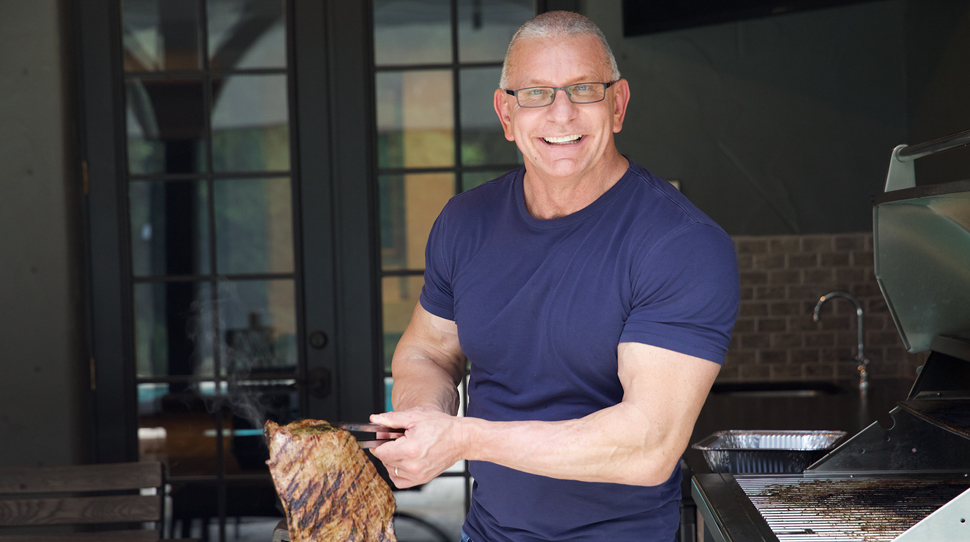

Forbes Travel Guide’s interview with Robert Irvine took place just two weeks before Hurricane Milton wreaked havoc on the chef’s home of Tampa, Florida. But even without any knowledge of a life-altering storm on the horizon, Irvine’s feelings for the city and the brave people who protect it are clear.
That sensitivity may come as a surprise to those who only know Irvine for his brash, straight-talking persona on hit Food Network shows Restaurant: Impossible and Dinner: Impossible. In the former, the England-born former Royal Navy enlistee never minces words in his efforts to revive struggling restaurants on the verge of collapse. But the tough love in the kitchen won over viewers’ hearts to the tune of the series airing for 22 seasons.
Irvine’s taken the program’s popularity and cooked up an epicurean empire that now includes restaurants, books, snack bars, a vodka and live appearances at food events such as the South Beach Seafood Festival (October 23 to 26). Still, Irvine’s proudest accomplishment may be the Robert Irvine Foundation, a nonprofit whose mission is to cook meals, bring awareness and raise funds for active military, veterans and first responders like the ones called into action after the recent Tampa tragedy.
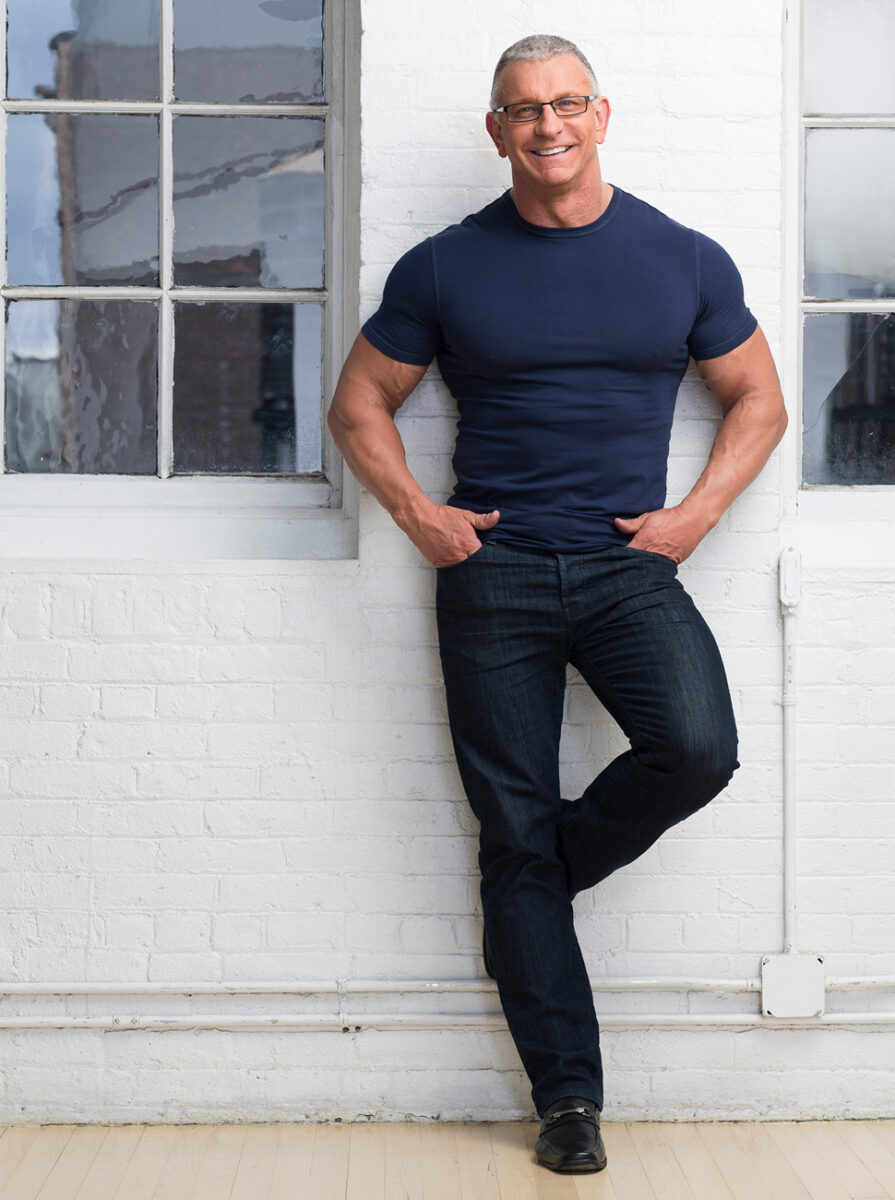
You’re a busy person. Tell me what a typical day looks like.
It depends. Every week is very different. I just came back last week from Latvia, Lithuania and Estonia. And then I went straight from there to Dallas, from Dallas to Colorado, and Colorado to Chattanooga, Tennessee. Got back last night. Today, I’ve been on emails and work calls all day to catch up because I’m away for a couple of weeks. It varies week to week, day to day. Just always busy.
I know health-conscious food is a big part of your life. Traveling from Colorado to Chattanooga to Latvia, how are you able to eat healthy?
I think it’s a choice. I think when you get into a habit of really maintaining that lifestyle, it’s not difficult. Although in some countries it’s difficult to get the same style of food [as you get at home], you can always get chicken and eggs. I work with the [United States] military 150 days a year around those areas and places we have troops. It’s easier for me because I’m amongst it every day. I’m modernizing the food service in the military with the help of the military, but I have different opinions than they do after 40 years of fighting.
But I don’t believe in strict diets, either. I think if you have a healthy eating plan and you eat moderately most things, you will maintain whatever you’re trying to build. So, for me, I don’t mind going out and having a couple of drinks and having dinner with friends. But the rest of the week, I’m focused on my six or seven meals a day. Obviously, on a plane, it’s a little different. If I’ve got a 17-hour flight, you can [maintain your eating plan] for one or two meals, but then you’re picking and choosing what you eat on a plane.
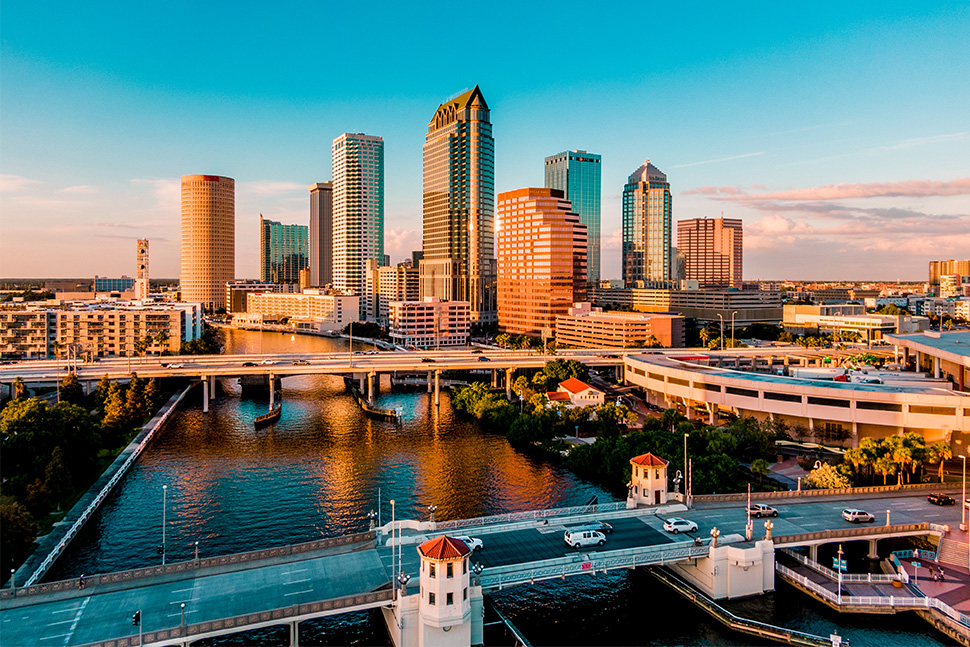
Did you just say six or seven meals a day?
Our bodies are not designed to eat breakfast, lunch and dinner. Our bodies are designed to eat small meals more frequently. I say eat protein the size of a deck of cards, carbohydrates the size of the old mouse on your computer and then as much vegetables as you want to eat — as long as they’re not soaked in butter.
The general consensus of eating is to be more resilient and be able to not fall asleep at 10 in the morning. It’s the way you eat. If you look at the way we feed our military, breakfast, lunch and dinner are never enough, especially for our special operations guys who don’t get breakfast, lunch and dinner. They have to eat whatever they eat. We have to be mindful of those jobs that these folks have, just like I have to be mindful of the stuff I do.
When I put people on exercise regimes, the food is the biggest part of an exercise regime. It’s not the amount of weight you lift; it’s the food that you eat to be able to lift that thing.
I had a great lunch today. The food, service and everything else were spot on. With your show Restaurant: Impossible, you deal with the exact opposite. Are there traits that all bad establishments have in common?
No. 1 is leadership. There’s nobody in charge. You can have an absentee owner and a manager who doesn’t care. I run restaurants all around the world. And for me, the owner, manager or whatever has to be fully vested in that restaurant or any business or it will fail. It can be a clothing business. It can be a bar business.
We have 13 companies. I have people who are there who are fully vested. We have 8,000 employees who care as much as me. I wrote a book about that called Overcoming Impossible, where I talk about empathetic leadership, which means that I know that [hypothetical employee] Missy has an autistic son and she’s got all these things on her mind. I have to know that when she comes into work. And if I see that, I’ll go, “Missy, go home. We got you. Just take care of what you need to take care of.” We do that with every one of my employees. If big companies did that, my goodness, their productivity would go through the roof.
So, I think empathetic leadership, trust, get rid of egos — theirs and yours — and always be authentic. Those are the four things that I feel are always neglected in business, even in Fortune 500 companies, if you want to make them successful. I don’t care how many billions they’ve made. Just think of the billions they could have made if you’d done these things. How do they treat their employees? What are the benefits for the employees to make them happy, to make them work, to make them come to a work environment that feels inclusive, no matter race, religion, salary level or whatever.
That’s why we’re having a problem in this country now, because people don’t want to do the things that we’ve been doing forever. People don’t want to work as a server, greeter or cook. Cooks make $27 an hour, but now there’s few of them around. It’s really difficult to find the people in the hospitality industry because, in the old days, they were verbally abused. Sometimes physically, meaning people were throwing things at them. I was one of them. I had knives and cups thrown at me. I think our world has changed. But those are the biggest traits of failure in any company, not just restaurants.
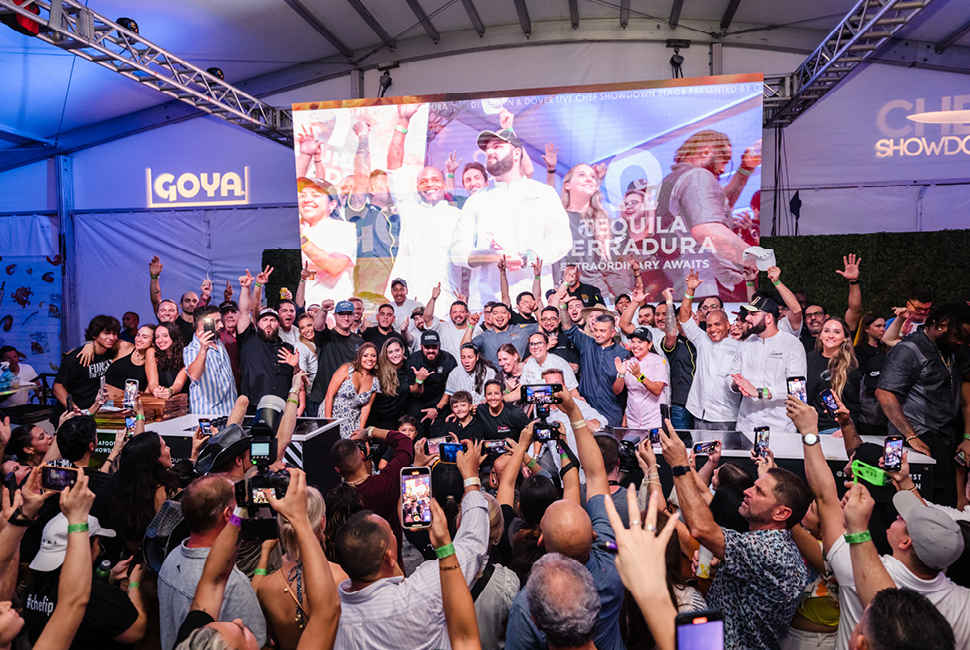
In what ways have you evolved as a businessman?
The good thing about me is I’ve always been empathetic. That doesn’t mean soft — big difference. Empathetic listening. The biggest change for me is not so much from me with my own businesses, but on the TV show, I’ve learned to listen more before I go in with a hammer. I can go in and design something and show you a new menu and teach you [how to be successful] in 48 hours, which I do very well and had a lot of success with people. The largest debt [from a business on Restaurant: Impossible] was $1.1 million. They’re doing $3.4 million [profit] today. I’ve learned to listen to what the original vision for that restaurant was instead of me just coming in and going, “Nope, it sucks. We’re doing this, we’re doing this and we’re doing this.” The more you get the buy-in from them, the more successful they will be and not revert to bad habits. I think that’s my biggest change.
What are you most excited about with the South Beach Seafood Festival?
It’s year number 12. I’m used to South Beach. I used to work there on cruise lines many, many years ago. I love it. I couldn’t live there today because it’s too crazy.
For me, it’s getting amongst the people, seeing the young chefs who are coming up now and getting to see old friends. Reconnecting. People think chefs are close. We’re all so busy, we don’t have time to be close. So, for me, it’s getting to see the people who pay their hard-earned money to come and have great food, interact with the chefs, watch the competitions I will be judging and eat stone crabs.
I think food and wine festivals, especially the South Beach Seafood Festival, bring people together. Food is the international language of hope and love, and seafood has become so prominent in our modern-day life. It used to be, “Let’s have a 20-ounce steak.” We’ve all gotten a lot healthier. We started to think more about our bodies. Seafood is obviously a great alternative to meat. I had cod for dinner last night. I’ll probably have salmon for dinner tonight.
Explain the festival competition you’ll be judging.
You thought Restaurant: Impossible was bad? When chefs get ingredients [at the festival competition] and they get to cook something, somebody says, “Oh, you got 45 minutes.” Then I decide, “Well, no, you don’t. You’ve got 15 minutes left.” I’ll add a secret ingredient or I’ll take away a knife. I think they add more value and fun to the audience. So, it’s not just cook, cook and cook.
I also think it’s a great place for young chefs to really get to be known and [build] a following. No matter in Miami, Fort Lauderdale, Tampa or wherever else, we’ve got some amazing chefs here who are not known. And my job, as an old guy, is to make sure that these kids who are great at what they do get shown the limelight a little bit.
Also, Florida is getting to see my new vodka, which I’m really happy about. The difference between everybody else’s vodka and mine is I own it. And the proceeds go to the Robert Irvine Foundation to help those in need, like our first responders, firefighters, police officers, our men and women who wear the cloth of our nation. Money helps buy things like service dogs and wheelchairs. Philanthropy and food go hand in hand because chefs are the most amazing, philanthropic people I know.
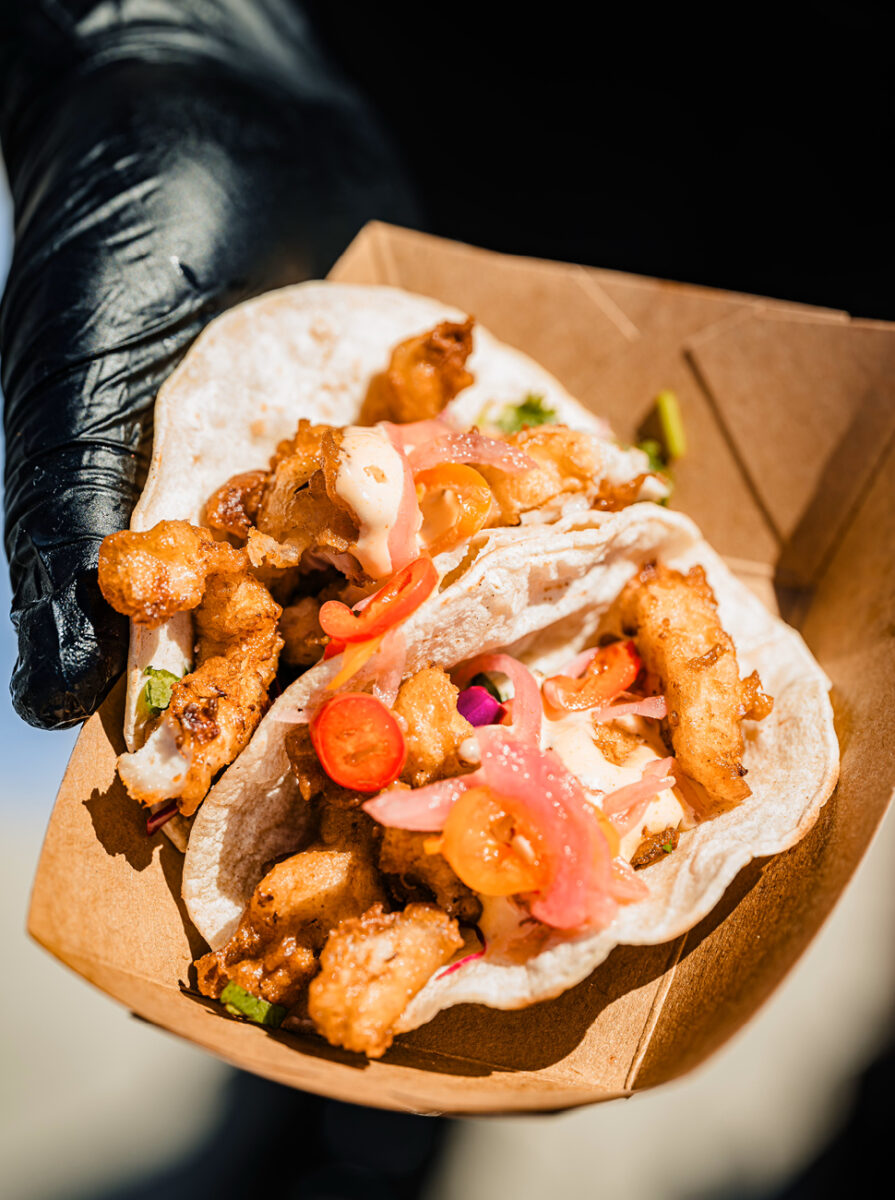
Do you live in Florida?
I’m going to give you a tongue-in-cheek answer here. I travel 345 days a year. One hundred and fifty of those are with the military. But I do have a home in Tampa. Love it, but I’m never here.
What are some must-try restaurants in Tampa?
One of them is Sunda. That’s where I’m going tonight. It’s one of my favorite restaurants. Just an amazing food experience. It’s more Asian, but not the Asian you think. It’s every Asian country. Very unique dishes.
Oak & Ola is another one. It’s one of my faves. Ulele is another. I could go on and on. Pick any one of them. If you go to Ulele, they’ve got a great brewery. They brew all their own stuff in the back. Tim [Shackton is] the brewmaster. The chef’s great. Very simple, but great food done well. Same with Sunda. They don’t have a distillery, but great drinks. It’s the newest restaurant, I think, in Tampa.
Knowing that you travel 300-plus days a year, do you get to explore the food scenes in those cities?
I get to go out — only if we’re not in a treacherous area. With the troops, obviously, we can’t do that. We’re not allowed to leave base. But [on other trips] I get to go out. We just had food in Lithuania that was mind-blowing to me. We had a local person take us to some of the good, hole-in-the-wall kind of stuff. Lithuania is, I don’t know, like 700, 800 years old. It’s just like going into a medieval village. They’ve got this place called the Hill of Crosses. I wish I could show you pictures right now. Just beautiful countryside, beautiful people, beautiful food. And you can get anything you want. You can walk down into a little alley and find a pizza joint, classic Lithuanian dishes or fine dining.
I did the same thing when I was in Afghanistan. We ate local food. Same thing in Poland and Germany. In Munich, I was there on a tour recently with a lot of famous actors. We were in a Munich beer house. It’s like the Sistine Chapel. If you look up at the ceiling, it’s painted in little vignettes and it’s just beautiful. It’s called Hofbräuhaus. There’s one in Vegas now, but it’s not as beautiful. There’s 3,000 people downstairs in Munich and 3,000 people upstairs. They run their food on conveyor belts and people make the plates. It’s really interesting.

We were in Greece on my honeymoon, in Mykonos, at a great little restaurant on the water. At the end of the meal, the waiter came up to the table and said, “Our owner wants to buy you dinner.” I just ate the whole menu three times. She’s a little old Greek lady with a headdress on. She said, through that waiter as a translator, “I watch Restaurant: Impossible all the time. I want you to see my kitchen.” And we did. It was immaculate. The show has been in 170 countries with a billion views. It’s a well-watched show. I look funny dubbed in Italian, Japanese and whatever. But yeah, I get to eat out a lot.
I was never much of an adventurous eater until I came to America. Coming from England, it’s a meat-and-potatoes kind of thing. My wife [retired pro wrestler Gail Kim] is second-generation Korean from Canada. She has pushed me way out of my comfort zones to eat different things. She’s a health nut. Way healthier than I will ever be, with tofu and all that stuff. I’m like, “Uh, sorry, guys, but I’m not eating tofu. No.”
If you were hosting a dinner party tonight, what are three or four dishes you’d prepare?
No. 1, I would never do that. I used to do that many years ago when I cooked for heads of state and wealthy families. I’d make a menu. It was an “eat what I tell you to eat” kind of thing when I had friends over. I used to do that and I’d get so stressed. What I do now is buy everything [beforehand]. I put out chicken, beef and fish. And when you come over, we create together because, to me, it’s a bonding thing. We create the menu as a team. We cook together. We clean together. We drink and eat together. I think that way is much better than me forcing something that you don’t like.
